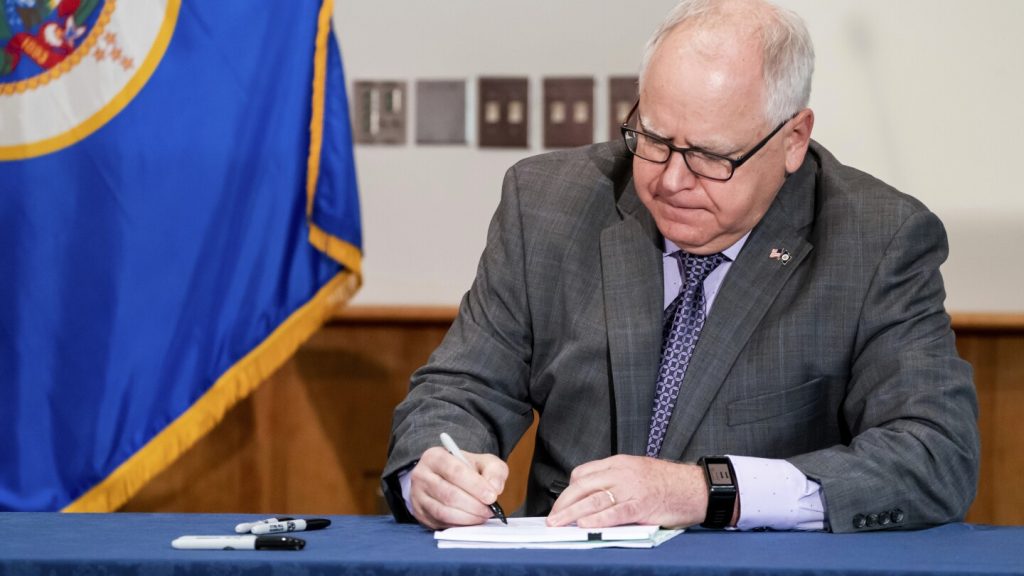(2020 words)
In response to Kamala Harris selecting Minnesota Gov. Tim Walz as the Democratic vice presidential candidate, the debate over his handling of the George Floyd protests in 2020 has been reignited. Following Floyd’s murder at the hands of a white Minneapolis police officer, protests erupted in Minneapolis and St. Paul, sparking a national conversation on racial discrimination and police misconduct. Criticism from Republicans has focused on Walz’s perceived lack of timely action during the protests, while progressive voices have criticized his approach to police reform. The unfolding of events during the protests and Walz’s subsequent actions have led to polarized opinions on his leadership.
The week following George Floyd’s murder on Memorial Day in 2020 saw escalating tensions in Minneapolis. Initially peaceful protests gave way to major looting, prompting the police chief to request National Guard assistance from Minneapolis Mayor Jacob Frey. Walz, a former National Guard veteran, approved a limited activation on May 28, albeit leaving most of the response to local authorities. The situation worsened as protestors seized control of the 3rd Precinct police station that same night. Walz criticized the city’s response on May 29 and ordered a full mobilization of the National Guard the next day, eventually restoring calm but not before significant damage had been done to businesses and buildings.
The aftermath of the protests saw criticism from Minnesota Republicans and praise from political allies for Walz’s handling of the crisis. A report by the Republican-controlled Minnesota Senate in October 2020 attributed the riots to a failure of executive leadership at both state and local levels, pinpointing Walz and Mayor Frey for not confronting the rioters sooner. Nonpartisan reviews supported these claims, citing a lack of clear leadership and delayed mobilization of the National Guard. Despite these criticisms, Walz defended his actions, emphasizing the collaborative efforts of local, state, and federal authorities as a successful model of response to crisis situations.
Former President Donald Trump’s contrasting statements on Walz’s handling of the protests further highlight the contentious nature of the debate. While Trump initially praised Walz for his actions in Minnesota during the crisis, he later criticized the governor for not acting sooner. Trump’s remarks underscore the political polarization surrounding Walz’s response to the George Floyd protests. Two nonpartisan external reviews conducted in 2022 found shortcomings in both the city and state responses, adding to the ongoing scrutiny of Walz’s leadership during the crisis.
In the aftermath of the protests, Walz has made efforts to reform policing in Minnesota, signing several police accountability packages in 2020, 2021, and 2023. While some advocacy groups, such as Communities United Against Police Brutality, have criticized Walz for not pushing for more substantial changes, political allies, including Attorney General Keith Ellison and civil rights attorney Ben Crump, have defended his efforts. Ellison commended Walz for navigating a challenging situation, balancing the city’s grievances with public safety concerns. Crump praised Walz as a compassionate leader for the grieving community, acknowledging the difficulty of finding a middle ground amidst differing opinions on his actions.
Overall, the debate over Governor Walz’s handling of the George Floyd protests and subsequent efforts towards police reform reflects the broader divide in American society regarding law enforcement, racial justice, and political leadership. While criticisms from Republicans and progressives highlight different aspects of Walz’s response, the governor’s own defense of his actions, combined with support from key political allies, demonstrates the complexity of leadership in times of crisis. As Walz’s role in the 2024 election cycle comes under scrutiny, his approach to policing and civil unrest will likely remain a focal point of debate among voters and observers alike.


